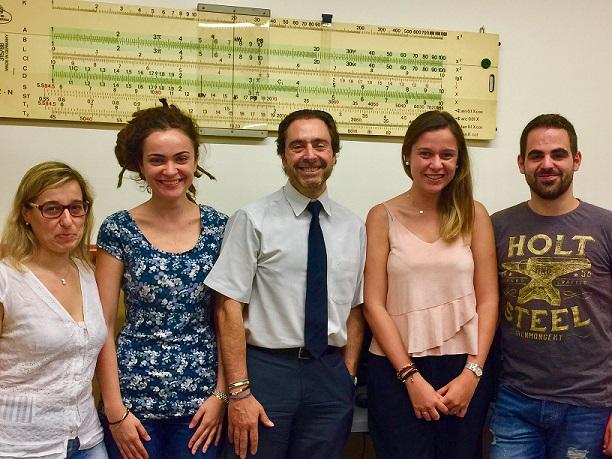A study carried out by the UB shows the patients’ brain adapts to cognitive changes caused by the disease

Credit: UB
Patients with Type 1 Diabetes (T1D) have a brain connectivity network different from the healthy people, according to a new study led by researchers of the Institute of Neurosciences and the Institute of Complex Systems (UBICS) of the University of Barcelona. This confirmation, reached with neuroimaging techniques and statistical models applied to complex systems, reinforce the idea that these patients’ brains develop a series of functional changes to adapt to cognitive alterations caused by this disease. These results could have potential implications in the diagnosis of diabetes and the study of other disorders with cognitive alterations.
The study, published in the science journal PLOS ONE, involves the participation of Joan Guàrdia and Maribel Peró Cebollero, from the Faculty of Psychology of the UB, Geisa Gallardo and Andrés González from the University of Guadalajara (Mexico), and Esteve Gudayol, from the Michoacan University of Saint Nicholas of Hidalgo (Mexico).
The study has explored -with magnetic resonance imaging techniques (fMRI)- the activation pattern for brain connectivity in fifteen patients with Type 1 Diabetes and a control group of fifteen healthy people while they carried out working memory tasks with visual stimuli. The neuroimaging technique measures the brain activity during the tasks thanks to the changes in the blood flux that take place in the brain depending on the areas with a higher energy use.
Adaptive mechanisms in the brain
The results of the working memory tasks were similar, but the analysis of brain connections showed important differences between the two participating groups. According to the authors, “patients with T1D showed a significant reduction of activation areas in the brain, compared to the control group, which showed a more complex connectivity network”. Moreover, the connectivity pattern in T1D patients affected the cerebellum and the red nucleus mainly. However, the control group involved other brain areas which activate when individuals carry out working memory tasks”. These results on the neuronal connections complete previous studies by the same team of researchers which showed different activation patterns in specific brain areas.
“These changes, and the fact that the results of the analysed tasks are similar, mean that the brain creates compensation mechanisms to fulfil cognitive demands which favour a better functioning”, notes Joan Guàrdia, professor of Psychology and first signer of the article. “Also, these data show that adaptations can be important, since T1D patients develop connectivity networks which are very different from healthy people”.
A methodology to explore other diseases
The analysis of differences in brain connectivity networks opens new study pathways for other population groups -pathological and healthy ones. “This study enabled us to show that a complex network can characterize the cognitive performance in a differentiating task between groups. At the moment, we are working on the methodology that was used in this study with patients with Mild Cognitive Impairment, people with depression and other collectives with cognitive alterations”, notes Joan Guàrdia.
Cognitive alterations in Type 1 Diabetes
T1D is a chronic disease caused by the lack of insulin production, the hormone that regulates sugar in blood. This type of diabetes forces patients to take insulin daily and is an important cause for blindness, kidney failure, heart attack, and other complications. Apart from these disorders, some patients can show a mild cognitive impairment which affects memory, measuring information processing speed, verbal skills, learning and executive functions, including working memory in children and adults.
###
Reference
Guàrdia-Olmos, J.; Gudayol-Ferré, E.; Gallardo-Moreno, GB.; Martínez-Ricart, M.; Peró-Cebollero, M.; González-Garrido A. A “Complex systems representing effective connectivity in patients with Type One Diabetes Mellitus”. PLOS ONE 13(11). November 2018. DOI: e0208247. https:/
Media Contact
Bibiana Bonmatí
[email protected]
34-934-035-544
Original Source
https:/
Related Journal Article
http://dx.



